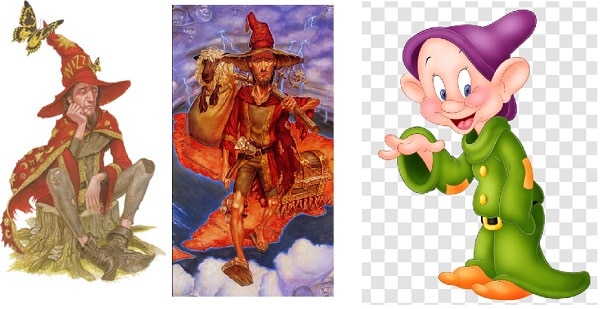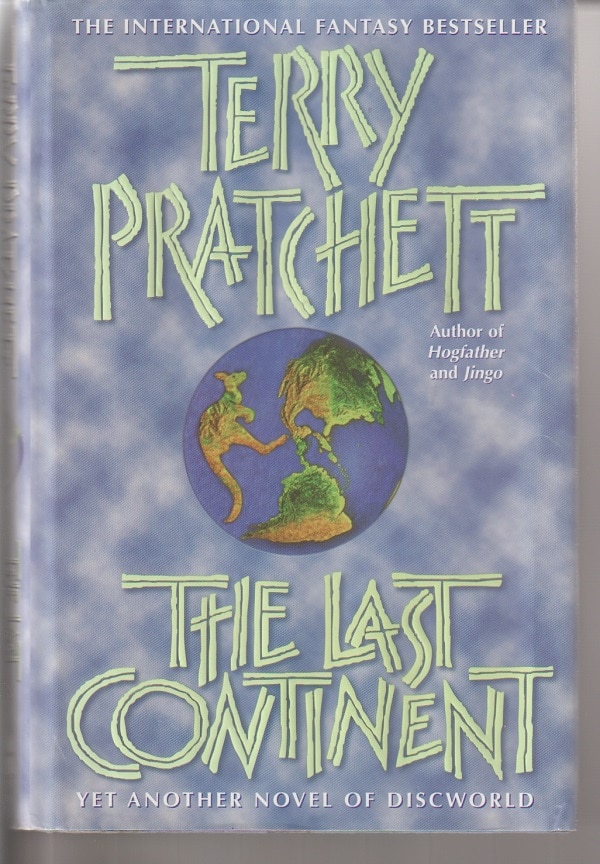Rincewind, the not very good wizard (or “Wizzard,” as his pointy hat says), is fleeing from gaol on the continent of XXXX, a place that’s pretty much unknown to the rest of Discworld because of its distance from all other land and because of the circular storm “girding” the shoreline.
In fact, it’s a lot like our Australia, so, when the running Rincewind looks to the side, he sees a kangaroo keeping pace with him, or an image of a kangaroo, or a mystical being masquerading as a kangaroo. This is not helping Rincewind’s equanimity:
“Listen, you giant jumping rat. I’ve made it to the docks, okay? I can outrun them! I can lie low! I know how to stow away, throw up, get discovered, be thrown over the side, stay afloat for two days by clinging to an old barrel and eating plankton sieved through my beard, carefully negotiate the treacherous coral reef surrounding an atoll and survive by eating yams!”
That about says it all.
Bad things happen to Rincewind, the central character of Terry Pratchett’s first Discworld novel The Color of Magic (1983) and in six others, including The Last Continent (1998). He knows bad things are going to happen so, generally, he takes off at the merest hint of danger. He flees. He flies. He skedaddles. He hot-foots it. He runs.
And he survives, even if that means he ends up in worse danger than he had been facing. Because he’ll escape from that, and from the next, and from the next.
“My beard”
As the center of a novel’s story, Rincewind leaves a lot to be desired. He’s not going to do anything heroic, at least on purpose. Often, Pratchett surrounds him with quirky secondary characters who bring a liveliness to the proceedings and don’t opt for flight as the first, second and third strategy of every situation.
In other words, Rincewind is, at least, for me, a bag of emptiness whenever he shows up in a Pratchett book. Which is why I am always disconcerted when, as in the quote above, there’s a reference to his beard, as in “sieved through my beard.”
I’ve seen drawings on Discworld covers and websites that show the Wizzard as a thin, almost thoughtful guy with a floppy robe and a scraggly beard along his chin.
By contrast, when I come upon Rincewind on the pages, the image that comes to my mind is that of one of the Seven Dwarfs — Goofy.

“A life of their own”
Oddly, despite the quote above, Rincewind spends much of The Last Continent not running. Instead, he’s kind of on a quest to save the day. What that means, he’s not sure. He’s led in this effort by that mystical kangaroo who can take many other shapes, such as a ram that leads sheep to be sheared, in record time.
Rincewind just hung onto the shears. They had a life of their own. The sheep flung themselves against the clippers as if in a real hurry to get into something more comfortable. Fleeces curled around his ankles, then around his knees, rose above his waist…and then the shears were slicing the air, and sizzling as they cooled down.
Several dozen dazed sheep were watching him very suspiciously. So were the sheep-shearers.
“You just sheared thirty sheep in two minutes!” roared Daggy.
What makes the scene so much fun is that Rincewind is such a doofus that there’s no way he could shear thirty sheep in two minutes — or even one sheep — without the help of that mystical ram/kangaroo. It’s another case of Rincewind as an emptiness that someone else fills.
Australia and Texas
There were times when I thought that The Last Continent wasn’t very good for a Pratchett novel. And others when it was very pleasurable. There were three reasons for that: Rincewind, a group of real wizards from the Unseen University and all the Australian jokes.
This is one of those not-so-rare cases when English doesn’t translate well into English.
Pratchett was British, writing for a predominately British audience. For them, Australia, the nation’s former colony and still ally, is a thing. They find a lot about Australia as odd and risible.
I guess it’s like Americans and Texas. The Brits might not get a lot out of American jokes about Texans, and that’s how I felt will all the humor about Australia.
“A friendly face”

But, if the Australian thing was draggy, at least Rincewind was being dragged in a generally positive direction by that kangaroo thing instead of creating negative space, as he is wont to do.
And, even when discussing Rincewind’s philosophy of life, Pratchett offered a very nice turn of phrase:
Rincewind had always been happy to think of himself as a racist. The One Hundred Meters, the Mile, the Marathon — he’d run them all. Later, when he’d learned with some surprise what the word actually meant, he’d been equally certain he wasn’t one. He was a person who divided the world quite simply into people who were trying to kill him and people who weren’t. That didn’t leave much room for fine details like what color anyone was.
There’s also a nice scene about halfway through the book when Death shows up in Rincewind’s gaol cell, and the “Wizzard” knows that this is the end of him and his running:
“You just can’t wait, can you?” said Rincewind bitterly.
NO WORRIES.
“So this is really it, then. I was supposed to save this country, you know. And I’m going to really die.”
OH, YES. THIS IS CERTAIN, I’M AFRAID.
After some more of this back and forth, Rincewind begins to get comfortable with the idea of dying. Well, not get comfortable. In fact, he carps at Death for coming around to gloat first.
I BEG YOUR PARDON?
“Just because I’m being hanged in the morning, I mean.”
ARE YOU? THEN I SHALL LOOK FORWARD TO HEARING HOW YOU ESCAPED. I’M DUE TO MEET A MAN IN…IN…AH, YES, INSIDE A CROCODILE….
“What? Then why are you here?”
OH, I THOUGHT YOU MIGHT LIKE TO SEE A FRIENDLY FACE.
“Unskilled labor”
The Last Continent is made up of two story threads: Rincewind’s adventures and those of the Unseen University wizards, headed by Archchancellor Ridcully, who end up on an isolated island millions of years in the past.
Pratchett does a lot of playing around with space and time and how they’re bendable and blendable. And, science idiot that I am, I get lost in that sort of talk.
What I did find fun were the encounters of the wizards with the god of the island, a god of evolution who was having a hard time getting the hang of things. He was making one of each kind of whatever he made. If that one died, he’d have to make a new improved version. Not terribly efficient.
So the wizards try to explain to him the facts of life, and, as single men of a certain age who have lived cloistered from much of humanity, particularly those of the female persuasion, do a bad job of it.
“They….er…the female…she…sort of makes the next one…inside her.”
The god stopped writing. “Now I know that’s not right. You can’t make an elephant inside an elephant—”
“Er, a smaller version.”
“Ah, once again I have to point out the flaw. After a few such constructions you’d end up with an elephant the size of a rabbit.”
After some more questions, the god starts to get the idea:
“And all this, er, this sex is done by unskilled labor?”
It’s a fun line. And, truth to tell, there are a lot of fun lines in The Last Continent.
Patrick T. Reardon
12.31.20
Written by : Patrick T. Reardon
For more than three decades Patrick T. Reardon was an urban affairs writer, a feature writer, a columnist, and an editor for the Chicago Tribune. In 2000 he was one of a team of 50 staff members who won a Pulitzer Prize for explanatory reporting. Now a freelance writer and poet, he has contributed chapters to several books and is the author of Faith Stripped to Its Essence. His website is https://patricktreardon.com/.
